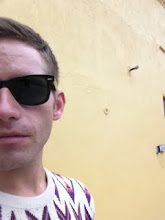 I moved to Connecticut the summer before my freshman year of high school. I was appalled with, among other things, the lack of film criticism in the local newspaper. So, by the time I was a sophomore, I had the idea for a column. My father, who is responsible for my borderline obsession with movies, and I started to write a father-and-son movie review column that fall. It was great, and lasted through high school and into college. He still maintains it, though now (after a few relatively unsuccessful guest spots by my little brothers) it's strictly a paternal affair. I still get the opportunity to help out in a pinch, though. So this week I contributed my take on Brideshead Revisted, the utterly lackluster adaptation of the beloved Evelyn Waugh novel. I'm running it below in its entirety. Enjoy.
I moved to Connecticut the summer before my freshman year of high school. I was appalled with, among other things, the lack of film criticism in the local newspaper. So, by the time I was a sophomore, I had the idea for a column. My father, who is responsible for my borderline obsession with movies, and I started to write a father-and-son movie review column that fall. It was great, and lasted through high school and into college. He still maintains it, though now (after a few relatively unsuccessful guest spots by my little brothers) it's strictly a paternal affair. I still get the opportunity to help out in a pinch, though. So this week I contributed my take on Brideshead Revisted, the utterly lackluster adaptation of the beloved Evelyn Waugh novel. I'm running it below in its entirety. Enjoy.I can't be the only one a little surprised to see a new version of Brideshead Revisited hit screens. Most agree that Evelyn Waugh's melodramatic saga received the definitive transfer in 1981 when BBC mounted an epic miniseries adaptation that featured Laurence Olivier and Claire Bloom, and launched the career of a budding Jeremy Irons.
That version meticulously captured Waugh's nuance and subtlety over 11 hours, so it's no surprise that the new film can't match its depth in under two. It's still the story of Charles Ryder (Match Point's Matthew Goode), a young man of earnest means who befriends the eccentric Sebastian Flyte (I'm Not There's Ben Whishaw) at a posh boarding school. Sebastian introduces Charles to the world of British nobility, which includes a killer spread (the titular Brideshead), a frigid mother (Howard's End's Emma Thompson), and a conveniently single sister (Cassandra's Dream's Hayley Atwell). Almost immediately after the Flytes accept Charles as one of their own, he realizes that their pristine image masks deep dysfunction. There's greed, jealously, class snobbery, religious fanaticism, and latent desire. You know, the storied terrain of the English class melodrama.
Unfortunately, for all the promise of suds and juicy subplots, director Julian Jarrold (Becoming Jane) has too much of a stiff upper lip to have any fun. The plot pivots on passion, desire, and betrayal, but Jarrold's morose, self-serious approach douses all of Waugh's flames. As such, watching Brideshead Revisited is the cinematic equivalent of nibbling on a soggy cucumber sandwich.
The actors, too, are mostly unable to convey the difficult emotional terrain their characters must traverse. Though effective as Jonathan Rhys-Meyer's smarmy brother-in-law in Match Point, Goode loses his footing here. He is either unable or unwilling to let us see Charles’ inner turmoil. Instead, he glides through scenes as if lost on the way to a photo shoot.
Whishaw and Atwell, as the spoiled, tragic Flyte siblings, are similarly underwhelming. Whishaw camps up Sebastian’s flamboyance to the point of caricature, and it’s hard to understand how Atwell could be anyone’s hotly contested object of desire.
Thankfully Thompson is on hand to class up the proceedings. Though it’s a little disarming to accept her as a graying matriarch (it’s the kind of role Judi Dench and Maggie Smith have been playing for years), there are few actresses who can convey so much by doing so little. When Thompson is on screen, the film really moves.
The production values, so often the saving grace for a film like this, fall short as well. It made me fondly recall Stephen Fry’s Bright Young Things, a jaunty, raucous take on Waugh’s Vile Bodies, and even the otherwise leaden Atonement, two films that presented great costume and set eye candy.
Video Pick: Howards End
The filmmaking team of director James Ivory and producer Ismael Merchant set the gold standard of British period films with this adaptation of E.M. Forster’s novel. Thompson stars here in her best role (which also won her an Oscar).


No comments:
Post a Comment